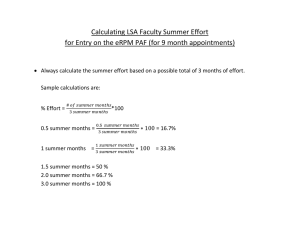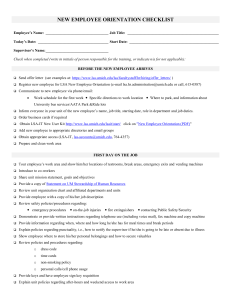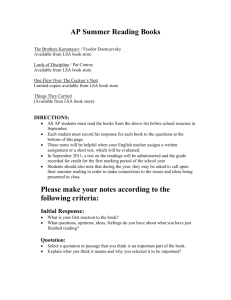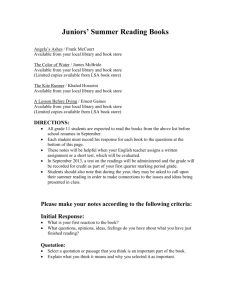Lending Library Booklist
advertisement
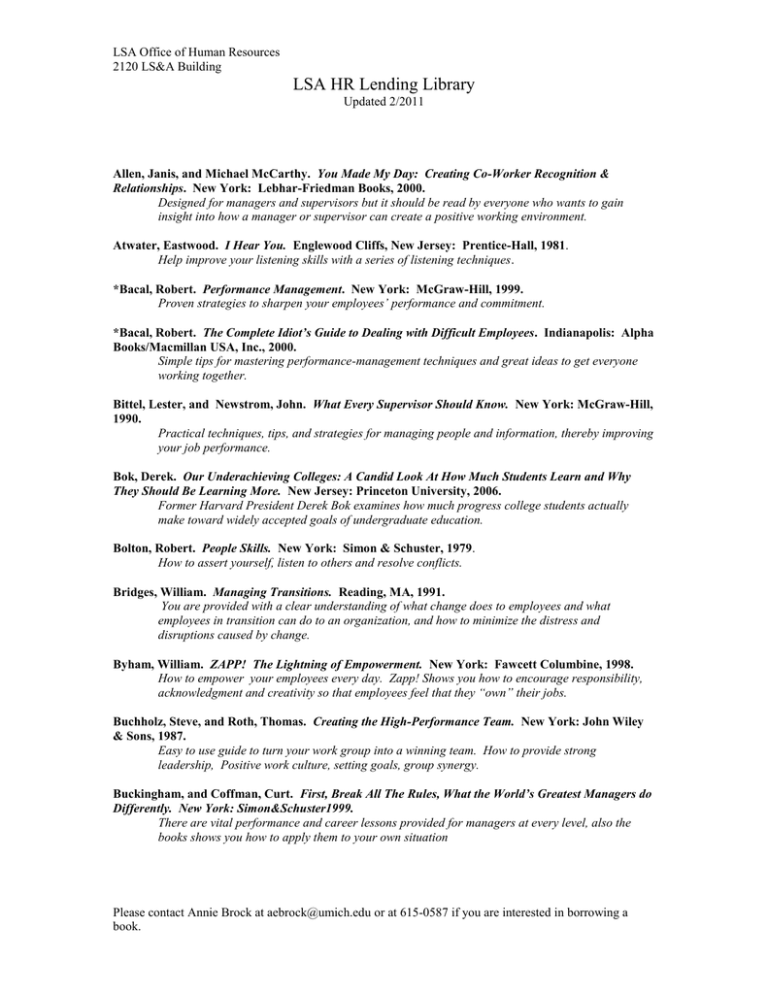
LSA Office of Human Resources 2120 LS&A Building LSA HR Lending Library Updated 2/2011 Allen, Janis, and Michael McCarthy. You Made My Day: Creating Co-Worker Recognition & Relationships. New York: Lebhar-Friedman Books, 2000. Designed for managers and supervisors but it should be read by everyone who wants to gain insight into how a manager or supervisor can create a positive working environment. Atwater, Eastwood. I Hear You. Englewood Cliffs, New Jersey: Prentice-Hall, 1981. Help improve your listening skills with a series of listening techniques. *Bacal, Robert. Performance Management. New York: McGraw-Hill, 1999. Proven strategies to sharpen your employees’ performance and commitment. *Bacal, Robert. The Complete Idiot’s Guide to Dealing with Difficult Employees. Indianapolis: Alpha Books/Macmillan USA, Inc., 2000. Simple tips for mastering performance-management techniques and great ideas to get everyone working together. Bittel, Lester, and Newstrom, John. What Every Supervisor Should Know. New York: McGraw-Hill, 1990. Practical techniques, tips, and strategies for managing people and information, thereby improving your job performance. Bok, Derek. Our Underachieving Colleges: A Candid Look At How Much Students Learn and Why They Should Be Learning More. New Jersey: Princeton University, 2006. Former Harvard President Derek Bok examines how much progress college students actually make toward widely accepted goals of undergraduate education. Bolton, Robert. People Skills. New York: Simon & Schuster, 1979. How to assert yourself, listen to others and resolve conflicts. Bridges, William. Managing Transitions. Reading, MA, 1991. You are provided with a clear understanding of what change does to employees and what employees in transition can do to an organization, and how to minimize the distress and disruptions caused by change. Byham, William. ZAPP! The Lightning of Empowerment. New York: Fawcett Columbine, 1998. How to empower your employees every day. Zapp! Shows you how to encourage responsibility, acknowledgment and creativity so that employees feel that they “own” their jobs. Buchholz, Steve, and Roth, Thomas. Creating the High-Performance Team. New York: John Wiley & Sons, 1987. Easy to use guide to turn your work group into a winning team. How to provide strong leadership, Positive work culture, setting goals, group synergy. Buckingham, and Coffman, Curt. First, Break All The Rules, What the World’s Greatest Managers do Differently. New York: Simon&Schuster1999. There are vital performance and career lessons provided for managers at every level, also the books shows you how to apply them to your own situation Please contact Annie Brock at aebrock@umich.edu or at 615-0587 if you are interested in borrowing a book. LSA Office of Human Resources 2120 LS&A Building LSA HR Lending Library Updated 2/2011 Coens, Tom and Jenkins, Mary. Abolishing Performance Appraisals: Why They Backfire And What To Do Instead. San Francisco: Berrett-Koehler, 2002. Practical suggestions for replacing performance appraisals are offered that have more progressive approaches to feedback and development. Areas such as coaching, compensation, and promotion are explored. Collins, Jim. How The Mighty Fall and Why Some Companies Never Give In. New York: HarperCollins, 2009. Offers leaders the well-founded hope that they can learn how to stave off decline and, if they find themselves falling, reverse their course. Cook, Marshall J. Effective Coaching. New York: McGraw-Hill, 1999. Explains how to apply sound coaching methods in the workplace, encouraging top performance by working with your employees, instead of over them. Covey, Stephen. The Seven Habits of Highly Effective People. New York: Simon & Schuster, 1990. Principle-centered approach for solving personal and professional problems, step-by-step pathway for living with fairness, integrity, honesty, and human dignity. Note: We have the paperback version as well as audio cassette Covey, Stephen. The 8th Habit from Effectiveness to Greatness. New York: Simon & Schuster, 2004 Explains how to solve such common dilemmas as management wants more for less; employees want more of “what’s in it for me” for less time and effort. This book transforms the way we think about ourselves and our purpose in life, about our organizations and about humankind. *Crane, Thomas G. The Heart of Coaching: Using Transformational Coaching To Create a HighPerformance Culture. San Diego: FTA Press, 1998, 1999. Transformational Coaching is a fundamentally different way of approaching the process of leading others to enhance their performance. It creates egalitarian, mutually-supportive, hightrust partnerships between people that transcend the traditional boss/subordinate roles. Dalai Lama, His Holiness, and Howard C. Cutler, MD. The Art of Happiness at Work. New York: Riverhead Books, 2003. The Dalai Lama’s first exploration of job, career, calling and finding the ultimate happiness at work. Douglass, Merrill E., and Donna N. Douglass. Manage Your Time Your Work Yourself, Updated Edition. New York: American Management Association, 1993. Changing time-squandering behavior can lead to less stress, a more balanced life and greater accomplishments. Outlines seven steps for transforming time wasters to time masters. Douglass, Merrill E., and Donna N. Douglass. Time Management for Teams. New York: American Management Association, 1992. By applying the principles in Time Management for Teams, you’ll be able to harness group creativity and help team members tackle projects quickly and effectively. Reveals how other people influence our use of time. Dutton, Jane E.. Energize Your Workplace, San Francisco: University of Michigan Business School: Management Series Dutton expresses practical ways to dramatically increase vital resources: the energy and achievements of organizations and the dignity, competence, and contributions of individual members. Please contact Annie Brock at aebrock@umich.edu or at 615-0587 if you are interested in borrowing a book. LSA Office of Human Resources 2120 LS&A Building LSA HR Lending Library Updated 2/2011 Fisher, Roger and William Ury. Getting to Yes, Negotiating Agreement Without Giving In. New York: Penguin Books, 1988. A straightforward universally applicable method for negotiating personal and professional disputes without getting taken-and without getting angry. Fisher, Roger and Scott Brown. Getting Together, Building Relationships As We Negotiate. New York: Penguin Books, 1988. Expanding on the principles of the book Getting to Yes, Negotiating Agreement Without Giving In, a straightforward approach to creating relationships that can deal with difficulties is offered. Step-by step initiating, negotiating and sustaining enduring relationships in business, government, friendships and in the family. Fournies, Ferdinand F. Coaching for Improved Work Performance. New York: McGraw-Hill, 2000. This guide is the one must-have coaching reference all managers need on their desks to help them keep their employees more productive and more focused – as well as more satisfied and happier at work! Gallagher, Carol. Going to the Top. New York: Penguin Books, 2000. A national expert on women’s leadership development reveals her proven model for success for women who want to thrive and advance at every step of the corporate ladder. Gladwell, Malcolm. The Tipping Point: How Little Things Can Make a Big Difference. Boston: Little, Brown and Company, 2002. The Tipping Point is that magic moment when an idea, trend or social behavior crosses a threshold, tips and spreads like wildfire. This book explores and illuminates the tipping point phenomenon and how people think and disseminate ideas. Greenleaf, Robert. Servant Leadership: A Journey into the Nature of Legitimate Power & Greatness. New York: Greenleaf Center, 2002. Servant Leadership helps leaders find their true power and moral authority to lead. It helps those served become healthier, wiser, freer, and more autonomous. This book encourages collaboration, trust, listening, and empowerment. Grote, Dick. The Performance Appraisal Question and Answer Book: A Survival Guide for Managers. New York: AMACOM, 2002. The most commonly asked questions about the dreaded appraisal process are addressed here in an easy to read Q&A format in a practical and user friendly way for the new and experienced managers alike. The manager is given very straight forward common sense answers to questions that might come up on a regular basis. Heath, Chip and Heath, Dan. Why Some Ideas Survive and Others Die: Made to Stick. New York: Random House, 2007. This book reveals the anatomy of ideas that stick and explain ways to make ideas stickier, such as applying the “human scale principle,” using the “Velcro Theory of Memory,” and creating “curiosity gaps.” Hemphill, Barbara. Taming the Office Tiger. New York: Kiplinger/Times , 2002 . The complete guide to getting organized at work. This book was a recommended book by a LSA Supervisor as a very helpful book on the subject of filing and handling paper. Hickman, Craig. Mind of a Manager Soul of a Leader. New York: John Wiley & Sons, Inc, 1990. Balancing managers and leaders, individually building upon their own unique perspectives and talents, while appreciating the talents and ideas of others. This author feels such balance comes Please contact Annie Brock at aebrock@umich.edu or at 615-0587 if you are interested in borrowing a book. LSA Office of Human Resources 2120 LS&A Building LSA HR Lending Library Updated 2/2011 not from within one person, but through the effective, open, and empowered interaction of different people who otherwise would fall back on counter productive conflict. *Hill, Jenny. Managing Performance: Goals, Feedback, Coaching, Recognition. Hampshire, England: Gower Publishing Limited, 1997. Make dramatic improvements in the workplace by focusing on four key elements: objectives, coaching, feedback and recognition. Will help you set clear objectives for yourself and your team. Imundo, Louis V. The Effective Supervisor’s Handbook. Second Edition. New York: American Management Association, 1991. Provides comprehensive answers, practical advice, proven procedures, and workable programs that can make the supervisor’s job easier, more effective, and rewarding. Inc. Magazine. Guide to Managing People. New York: Prentice Hall Press, 1989. Practical advice on developing a motivated team of employees, how to write a personnel manual, what incentives work best and how to use power constructively. Johnson, Spencer MD. Who Moved My Cheese?. New York: G.P. Putnam’s Sons, 1998. An amazing way to deal with change in your work place and in your life. Kelly, Robert. How to Be a Star at Work. New York: Three Rivers Press, 1998. Nine breakthrough strategies you need to succeed. Find out what separates stars from others. Kindler, Herbert. Managing Disagreement Constructively. Los Altos, CA: Crisp Publications, 1988. This book helps you anticipate and prevent destructive conflict, deal with disagreement before it erupts out of control and manage disagreement with more skill and assurance. Kohn, Alfie. Punished by Reward. New York: Houghton Mifflin Company, 1993. The trouble with gold stars, incentive plans, A’s, praise, and other bribes. Kotter, John. Leading Change. Boston: Harvard Business School Press, 1996. Provides the experience and positive role models for leaders and an eight step process that every company must go through to achieve its goal and show where and how good people often derail. Lancaster, Lynn and Stillman, David. When Generations Collide New York: HarperCollins Publishers, 2002 Who they are, why they clash, how to solve the generational puzzle at work. Lawson, Ken. Guide to Managing Your Career: Dorling Kindersley Publishing, 2000 A guide to manage a happy and successful career. Lockwood, Georgene. The Complete Idiot’s Guide to Organizing Your Life, New York: Alpha Books, 1999. Quick and easy ways to eliminate clutter from your home and office. Lundin, Stephen. Fish! New York: Hyperion, 2000. A remarkable way to boost morale and improve results. Mackenzie, Alec and Kay Waldo. About Time! A Women’s Guide to Time Management. New York: McGraw-Hill Book Company, 1981. Please contact Annie Brock at aebrock@umich.edu or at 615-0587 if you are interested in borrowing a book. LSA Office of Human Resources 2120 LS&A Building LSA HR Lending Library Updated 2/2011 Maddux, Robert. Effective Performance Appraisals for Quality Student Service. Washington, DC: Crisp Publication, 1987. The critical building blocks of how to conduct an effective performance appraisal are introduced. Maddux, Robert. Team Building: An Exercise in Leadership. Los Altos, CA: Crisp Publication, 1988. Provides the principles and methods needed to develop successful problem solving teams. Learn how to convert groups into teams. McCallister, Linda. I wish I’d said that! New York: John Wiley & Sons, Inc, 1992. This book identifies the six major styles of communication that exist in our country. If you know how to talk to people, you can get them to respond in a positive way. McKirchy, Karen. Powerful Performance Appraisals: How to Set Expectations and Work Together to Improve Performance. Franklin Lakes, NJ: Career Press, 1998. A positive and practical guide that can help you breathe new life and purpose into the process of evaluating your employees. Menand, Louis. The Marketplace Of Ideas: Reform and Resistance in the American University. New York: W.W. Norton & Co., Inc., 2010 This book argues that although the demographics, the mission, and the scale of American higher education have all changed dramatically, its institutional structure and educational philosophy have remained relatively static for the last hundred years. Mishra, Aneil, Ph.D. and Mishra, Karen, Ph.D. Trust is Everything: Become the Leader Others Will Follow. 2008. This is a book about ordinary people becoming extraordinary leaders. They did this by building the ROCC of Trust: Reliability, Openness, Competence and Compassion. By following their examples, you, too, can become the leader others will follow. Moawad, Bob. Increasing Human Effectiveness: Managing the Rapids of Change. Tacoma, WA: Edge Learning Center. Through this eight audio cassette series, you will learn how to overcome negative attitudes, and empower yourself resulting in greater productivity and increased effectiveness in every aspect of life. Nathan, Rebekah. My Freshman Year: What A Professor Learned By Becoming A Student. New York: Penguin Books, 2006. This book offers a good understanding of the current generation of college students and the broader culture from which they have emerged. Neal, James E., Jr. Effective Phrases for Performance Appraisals: A Guide to Successful Evaluations, Ninth Edition. Perrysburg, OH: Neal Publications, Inc., 2000. The phrases contained in this handbook are extremely positive and reflect superior performance – by simply altering the phrases, it is possible to describe areas in need of improvement. Nelson, Bob. 1001 Ways to Reward Employees. New York: Workman Publishing, 1994. Praising, recognizing and rewarding employees becomes a little easier using the ideas offered in this book. You are provided with ideas, inspiration and resources to enable you to make praising, recognition and rewards a permanent part of your management style. Please contact Annie Brock at aebrock@umich.edu or at 615-0587 if you are interested in borrowing a book. LSA Office of Human Resources 2120 LS&A Building LSA HR Lending Library Updated 2/2011 O’Reilly, Charles A., III, and Jeffrey Pfeffer. Hidden Value: How Great Companies Achieve Extraordinary Results with Ordinary People. Boston: Harvard Business School Press, 2000. Presents powerful examples of companies that live their values and value their people – and are extraordinarily successful. For anyone who wants to create a great, enduring company. Perlow, Leslie A. Finding Time: How Corporations, Individuals, and Families Can Benefit from New Work Practices. Ithaca, NY: Cornell University Press, 1997. Gives a picture of workers in a chronic sense of crisis, pelted by interruptions and too busy to help colleagues. This work culture sucks time out of workers’ home lives and also hurts the bottom line. Challenges the assumption that the more employees work, the better the corporation will do. Pickering, Peg. How to Manage Conflict: Turn All Conflicts into Win-Win Outcomes, 3rd Edition. Franklin Lakes, NJ: Career Press, 2000. This practical handbook is a manager’s map to handling conflict. Its guidelines offer practical solutions for handling the day-to-day conflicts that are inevitable in all types of businesses. Poertner, Shirley, and Karen Massetti Miller. The Art of Giving and Receiving Feedback. West Des Moines: American Media Publishing, 1996. Will help you and your coworkers effectively respond to one another’s work and improve job performance. Potter, Beverly. Preventing Job Burnout. Los Altos, CA: Crisp Publications, 1987. Eight proven strategies to beat job burnout. Renner, Peter. The Instuctor’s Survival Kit: A Handbook for Teachers of Adults. Vancouver, B.C.Canada: Training Associates Ltd, 1983. Ice breaking techniques to use with a new group, ways to involve learners and to utilize standard visual aids along with information to help you develop your interpersonal and planning skills. Scholetes, Peter. The Team Handbook. Madison, WI: Joiner Associates Inc, 1988. Practical guide to working in or with project teams, with step-by-step instructions showing how to implement quality improvement principles. Smith, Hyrum. 10 Natural Laws of Successful Time and Life Management. New York: Warner Books, 1994. Proven Strategies for increased productivity and inner peace written by the CEO of Franklin Quest Company. Stone, Douglas, Bruce Patton, and Sheila Heen. Difficult Conversations: How to Discuss What Matters Most. New York: Penguin Books, 1999. Walks you through a proven step-by-step approach for how to have your toughest conversation with less stress and more success, how to keep it constructive and focused regardless of how the other person responds. Sutton, Robert I. The No Asshole Rule. New York: Warner Business Books, 2007. This book sheds real analytical light on how insensitive employees ruin morale, lower productivity, and can truly devastate a company’s culture. The book not only confronts this issue, but also provides extensive strategies and insights into how your company can pinpoint and eliminate this problem. Please contact Annie Brock at aebrock@umich.edu or at 615-0587 if you are interested in borrowing a book. LSA Office of Human Resources 2120 LS&A Building LSA HR Lending Library Updated 2/2011 Torres, Cresencio and Jerry Spiegel. Self Directed Work Teams: A Primer. San Diego:University Associates, Inc.,1990. A source of information, benefits, and key strategies essential to implementing successful selfdirected work-team systems. Ulrich, Dave. Human Resource Champions: The Next Agenda for Adding Value and Delivering Results. Boston: Harvard Business School Press, 1997. A practical approach to HR in a business environment; helps us understand prior failures and the necessary steps for future successes in HR management. Weisbord, Marvin. Productive Workplaces. San Francisco: Jossey-Bass Publishers, 1987. The histories and theories of the founders of organizational development are integrated together with case histories and guidelines. Yate, Martin. Knock em Dead With Great Answers to Tough Interview Questions. Holbrook, MS: Bob Adams, Inc., 1992. Tips on how to prepare for the interview, hidden job markets, hints on presenting yourself in the interview and the best way to organize your answers to highlight your talents. Please contact Annie Brock at aebrock@umich.edu or at 615-0587 if you are interested in borrowing a book.
